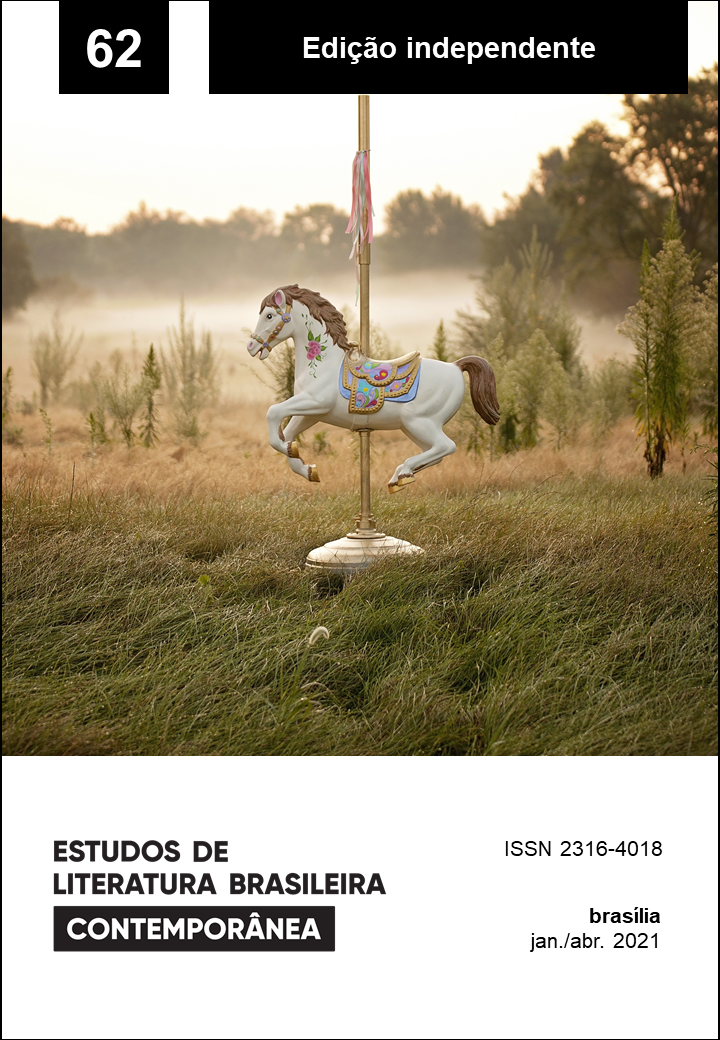Livros do Mal: From Virtual Publishing to Editorial Self-Legitimation
DOI:
https://doi.org/10.1590/2316-4018623Keywords:
Livros do Mal, contemporary Brazilian literature, internet, editorial, Brazilian literary systemAbstract
In this work we analyze the configuration and performance of the independent publishing house Livros do Mal (from 2001 to 2004), within the scope of the Contemporary Brazilian Literary System (Even-Zohar, 2003a). To do this, we focus on the context of the publisher's creation, influenced by the emerging experience of online publishing shared by its editors/writers and by the success of the CardosOnline e-zine. We conduct a brief review of the nine titles published by the publisher, emphasizing the recurring repertoires and trying to draw an editorial profile. Finally, we focus on the end of the editorial project, which resulted from the impasse between the functions of writer and editor, summarizing part of the legacy of the publishing house.
Downloads
References
ARRAIS, Daniela (2008). E-zine Cardosonline completa dez anos. Informática. Folha de S. Paulo, Entretenimento, F6, 17 set. Disponível em: http://www.qualquer.org/cardoso/COL.pdf. Acesso em: 2 abr. 2020.
BALDI, Cristiano (2002). Ou clavículas. Porto Alegre: Livros do Mal.
BENVENUTTI, Marcelo (2002). Vidas cegas. Porto Alegre: Livros do Mal.
BULLAR, Paulo (2002). Humus. Porto Alegre: Livros do Mal.
CABRAPRETA (s.d.). Página pessoal de Daniel Pellizzari. Disponível em: http://www.cabrapreta.org Acesso em: 17 mar. 2020.
CARDOSONLINE: fanzine por e-mail (2001). Disponível em: http://www.qualquer.org/col/ Acesso em: 11 mar. 2018.
CARVALHO, Bernardo (2002). Autonomia de um conto. Folha de S. Paulo, Ilustrada, 5 jan. Disponível em: http://www1.folha.uol.com.br/fsp/ilustrad/fq0501200216.htm Acesso em: 5 abr. 2020.
COLONETTI, Milton (2010). Livros do Mal: um problema de história editorial. 2010. 118f. Dissertação (Mestrado em Literatura Brasileira) – Universidade Federal do Rio Grande do Sul, Porto Alegre. Disponível em: https://www.lume.ufrgs.br/bitstream/handle/10183/28060/000766121.pdf?sequence=1 Acesso em: 12 mar. 2020.
DALCASTAGNÈ, Regina (2012). Literatura brasileira contemporânea: um território contestado. Vinhedo: Horizonte.
DEVES, Maristela Scheuer (2016). “Meia-Noite e Vinte”, de Daniel Galera, traça retrato de uma geração. Pioneiro, Cultura e lazer, 10 dez. On-line. Disponível em: https://bit.ly/3oYvVAu Acesso em: 27 mar. 2020.
EVEN-ZOHAR, Itamar (2003a). O sistema literário. Revista Translatio, Porto Alegre, n. 3, p. 1-24. Disponível em: http://seer.ufrgs.br/index.php/translatio/article/view/42900 Acesso em: 23 mar. 2020.
EVEN-ZOHAR, Itamar (2003b). Teoria dos polissistemas. Revista Translatio, Porto Alegre, n. 3, p. 1-21. Disponível em: https://seer.ufrgs.br/translatio/article/view/42899 Acesso em: 23 mar. 2020.
FERNANDES, Rinaldo de (2012). O conto brasileiro do século XXI. As narrativas curtas da nova literatura nacional divididas em cinco grandes vertentes. Revista Graphos, v. 14, n. 1, p. 173-188. Disponível em: https://periodicos.ufpb.br/ojs2/index.php/graphos/article/view/13407/8087 Acesso em: 24 mar. 2020.
GALERA, Daniel (2001). Dentes guardados. Porto Alegre: Livros do Mal.
GALERA, Daniel (2002). Um mouse na mão e muitas idéias na cabeça. [Entrevista a] Alexandre Inagaki. Prólogo. Disponível em: http://cabrapreta.org/ldm/clip_prologo.html Acesso em: 23 mar. 2020.
GALERA, Daniel (2003). Até o dia em que o cão morreu. Porto Alegre: Livros do Mal.
GALERA, Daniel (2006). [Entrevista a] Julio Daes Borges. Digestivo Cultural, 12 jun. Disponível em: http://www.digestivocultural.com/entrevistas/entrevista.asp?codigo=2&titulo=Daniel_Galera Acesso em: 19 dez. 2019.
GALERA, Daniel; PELLIZZARI, Daniel; PILLA, Guilherme (2003). O projeto. CabraPreta – Página pessoal de Daniel Pellizzari. Disponível em: http://cabrapreta.org/ldm/projeto.html Acesso em: 9 abr. 2020.
GALERA, Daniel; PELLIZZARI, Daniel; PILLA, Guilherme (2002). Sob a bandeira d’O Pinto. [Entrevista a] Rodolfo Filho. A Tarde, out. Disponível em: http://cabrapreta.org/ldm/clip_atarde.html Acesso em: 17 mar. 2020.
GÓIS, Marco Lúcio de Souza (2015). As faces de Bakhtin: uma análise discursiva de capas de livros. Linguagem em (Dis)curso – LemD, Tubarão, v. 15, n. 3, p. 431-448, set./dez. Disponível em: http://www.scielo.br/pdf/ld/v15n3/1518-7632-ld-15-03-00431.pdf Acesso em: 15 mar. 2020.
GUILHERME Pilla. Perfil no Flickr. Disponível em: https://www.flickr.com/photos/guipilla/ Acesso em: 9 mar. 2020.
NATUSCH, Igor (2011). Literatura na internet: a egotrip do Cardosonline, um século depois. Sul 21, 10 set. Disponível em: https://www.sul21.com.br/noticias/2011/09/a-grande-egotrip-do-cardosonline-um-seculo-depois/ Acesso em: 15 mar. 2020.
OLIVEIRA, Nelson (2003). Geração 90: os transgressores. São Paulo: Boitempo Editorial.
PELLIZZARI, Daniel (1997). Quatro gargantas cortadas. Folhetim. On-line. Disponível em: http://cabrapreta.org/4gc/ Acesso em: 23 mar. 2020.
PELLIZZARI, Daniel (2001). Ovelhas que voam se perdem no céu. Porto Alegre: Livros do Mal.
PELLIZZARI, Daniel (2002). O livro das cousas que acontecem. Porto Alegre: Livros do Mal.
RANCHOCARNE. Página pessoal de Daniel Galera. Disponível em: http://www.ranchocarne.org/ Acesso em: 17 mar. 2020.
SCOTT, Paulo (2003). Ainda orangotangos. Porto Alegre: Livros do Mal.
TEIXEIRA, Jerônimo (2006). A horda dos transgressores. Veja, São Paulo, 1º mar.
TERRON, Joca Reiners (2003). Hotel Hell. Porto Alegre: Livros do Mal.
TRASEL, Marcelo (2001). Prosa gaúcha sem sotaque. Carta Capital, n. 161, p. 6317, out. Disponível em: http://cabrapreta.org/ldm/clip_carta.html Acesso em: 7 abr. 2020.
Downloads
Published
How to Cite
Issue
Section
License
Copyright (c) 2021 Rosângela Fachel de Medeiros

This work is licensed under a Creative Commons Attribution-NoDerivatives 4.0 International License.
Authors who publish in this journal agree to the following terms:
a) The authors maintain the copyright and grant the journal the right of first publication, the work being simultaneously licensed under the Creative Commons Attribution License-Non Commercial 4.0 which allows the sharing of the work with acknowledgment of the authorship of the work and publication this journal.
b) Authors are authorized to enter into additional contracts separately, for non-exclusive distribution of the version of the work published in this journal (eg publish in institutional repository or as a book chapter), with authorship recognition and publication in this journal.
c) Authors are allowed and encouraged to publish and distribute their work online (eg in institutional repositories or on their personal page) after the editorial process, as this can generate productive changes, as well as increase the impact and citation of published work (See The Effect of Free Access).
d) The authors of the approved works authorize the magazine to, after publication, transfer its content for reproduction in content crawlers, virtual libraries and the like.
e) The authors assume that the texts submitted to the publication are of their original creation, being fully responsible for their content in the event of possible opposition by third parties.


